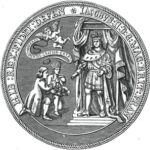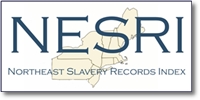The Northeast Slavery Records Index (NESRI) is an online searchable compilation of records that identify individual enslaved persons and enslavers in the states of New York, Maine, New Hampshire, Vermont, Massachusetts, Rhode Island, Connecticut, New Jersey and Pennsylvania. Click below to see our complete collections for each state:
New York – Maine – New Hampshire – Vermont – Massachusetts – Rhode Island – Connecticut – New Jersey – Pennsylvania

Seal of the Dominion of New England (1686)
NESRI indexes census records, slave trade transactions, cemetery records, birth certifications, manumissions, ship inventories, newspaper accounts, private narratives, legal documents and many other sources. The goal is to deepen the understanding of slavery in the northeast United States by bringing together information that until now has been largely disconnected and difficult to access. This allows for searches that combine records from all indexed sources based on parameters such as the name of an owner, a place name, and date ranges.
NESRI also serves communities seeking to understand their histories of enslavement. Our Community-Locality Reports present enslavement records for a state, county, town or city. While our collection of records is never complete and always growing, our customized report provides a head start in the local research process, identifying records that might otherwise take months or years to locate.


